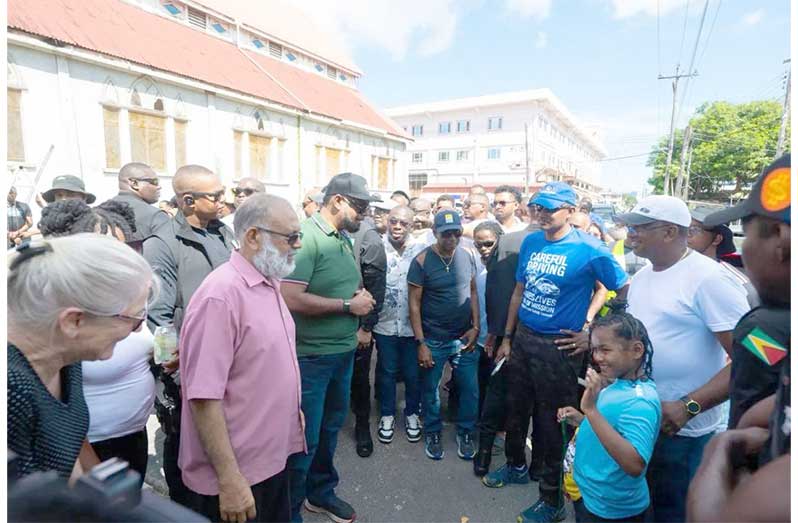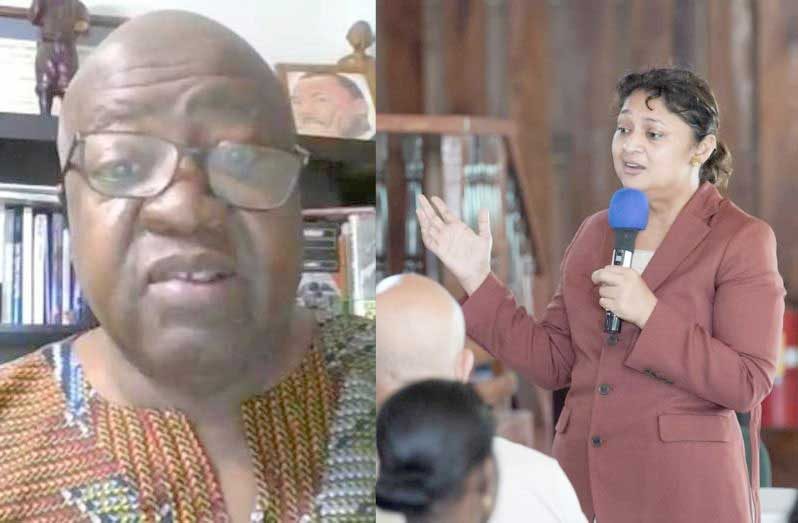—rejects ‘race-baiting’ attacks, says Government is focused on lifting Tiger Bay families
MINISTER of Local Government and Regional Development, Priya Manickchand, has called out political commentator and newly sworn-in MP Dr David Hinds, rejecting what she described as “old, backward, race-baiting politics” and reaffirming the People’s Progressive Party Civic (PPP/C) administration’s commitment to transforming Tiger Bay into one of Georgetown’s first model neighbourhoods.
Hinds, during his Monday night programme Politics 101, criticised photographs showing Manickchand interacting with children in the community during a walkabout.
He claimed the images made “a poppy show of the poverty of our people” and argued that such scenes would not be tolerated in Indo-Guyanese areas.
On Tuesday, Minister Manickchand did not hold back to dismiss the criticism outright, calling Hinds’ attack a desperate attempt at relevance.
“This abusive fossil is trying for some relevance. Let’s indulge him… What did Hinds and Co ever do for Tiger Bay or people of African descent generally? EVER? Nothing,” she said in a statement posted to her Facebook page.
She charged that during the APNU+AFC administration, communities like Tiger Bay were ignored while thousands of young Afro-Guyanese were denied opportunities for genuine advancement.
“In their time in recent government, APNU/AFC did nothing to empower people and nothing at all to empower vulnerable communities or African Guyanese. Not a single African Guyanese family, that wasn’t connected to the elite, was built up through being awarded civil works or higher education opportunities,” she said.
Manickchand argued that Hinds’ commentary is rooted not in concern for the community, but in political opportunism.

“The likes of David Hinds would like to see African people struggle and stumble and go into or stay in poverty so he can exploit them using his old race baiting for his narrow political gains. I say get from here. That is old and backward and will not be accommodated in this Government and by me,” she said.
She added pointedly: “As you all know, we are picking up derelicts now and rubbishing them… where can I find Hinds?”
TRANSFORMATION OF TIGER BAY ALREADY UNDERWAY
The government is currently advancing a comprehensive initiative to transform Tiger Bay and neighbouring communities into Georgetown’s first model neighbourhood.
The project falls under the wider Rescue Georgetown plan, which aims to restore the capital’s landscape, strengthen community infrastructure, and improve social services across vulnerable districts.
President Dr Irfaan Ali, who visited the community Sunday, emphasised that the intervention is centred on safety, pride, and long-term community development.
“We are going to work with the community in creating community ownership, community security, because you will have to help us and the police to keep these communities safe; clean,” the President said.
A committee led by Minister Manickchand has already begun engagements with residents to identify urgent needs and guide the rollout of works.
The plan envisions rehabilitated public spaces, community policing support, upgraded homes, vocational training, and the establishment of community facilities. Three plots donated by the owner of Mattai’s Food Market will house football and basketball courts with lighting, while the School of the Nations has committed to working directly with children in the area.
The Men on Mission (MoM) programme will support the housing and social-uplift components, and families will receive assistance to monetise land and expand income-generating ventures.
Ali said the objective is to eliminate the stigma associated with Tiger Bay.
“We have to remove a big stigma here, and we are going to remove it as a neighbourhood of love,” the President said. “People must know they are secure, they’re safe.”
As part of the city-wide transformation, the government is also pursuing major upgrades to Georgetown’s drainage network, adopting a multi-agency strategy to tackle high-risk zones and longstanding infrastructure deterioration.
Manickchand stressed that the administration’s work in Tiger Bay is about dignity and upliftment—not politics, not optics, and certainly not division.
“Every Guyanese will rise up, and I make no apologies and have no reservations in aggressively going after that cause,” she said.
Her position stands in stark contrast to Hinds’ framing of the issue along racial lines. While he accused the government of exploiting poverty, President Ali and Minister Manickchand have repeatedly underscored that the initiative is people-centred and grounded in long-overdue community revitalisation.



.jpg)









